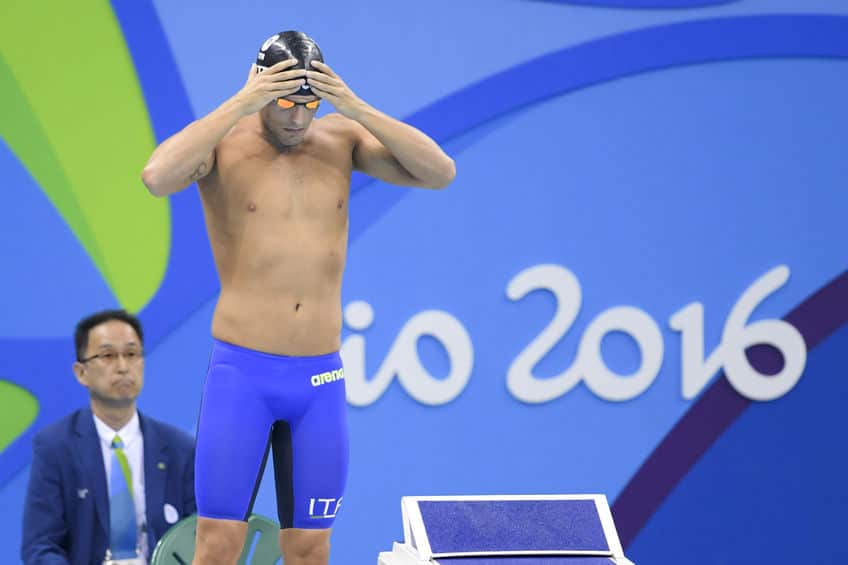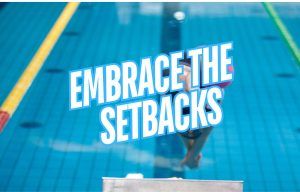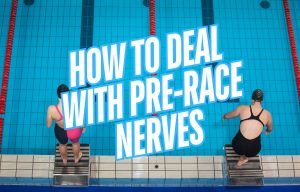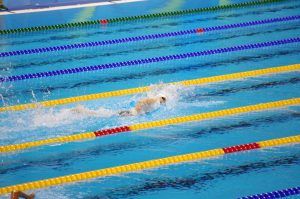
6 Benefits of Visualization for Swimmers
Wondering what visualization can do for your swimming? Here are some evidence-based benefits of visualization for swimmers for more confidence, less choking, and even better technique.

Practice makes perfect.
Practice makes permanent.
Practice makes me eat bowls of pasta until I’m full…of shame.
We’ve heard these lines before from coaches, parents, and tallish swimmer-authors who write about mental training and stuff on their website. (That’s me, in case there was confusion.)
Practice is a lot of things to us swimmers: it’s where we go to get all wrinkle-fingered. Where we social kick with our friends. And where our coaches throw main sets at us that leave us so stunned that all we can do is laugh.
Most of us work hard. We huff and puff through the test sets. And we grit our teeth and struggle through the struggley moments in training.
But beyond effort, how focused and deliberate is the swimming you are doing each day?
Is your training slowly being escalated each week, with small measurements of improvement being the goal?
Are you doing those “I can’t feel my shoulders anymore” sets with the best possible technique and attention to crushing your walls, flip-turns, and streamlines?
Mental training finally made simple. Get mentally tougher, choke-proof your races, seriously escalate self-confidence, and much more.
Used by some of the top swimmers and coaches on the planet, Conquer the Pool is the swimmer’s ultimate weapon for a better mindset and faster swimming.
Working hard is awesome—but if you want that high grade, AAA-rated performance on race day at the end of the season, you need to inject deliberate focus into that effort.
Which should make you wonder…
Is the swimming you are doing in practice each day reflecting what you want to accomplish during championship season?
Are you being all that deliberate in your training, or are you going in to the pool, swimming through the sets and kinda hoping that you automagically unlock some new level of speed on race day?
Here are some questions to ask yourself that will help you sharpen your effort and focus during training:
It’s not enough to go to the pool and work hard. Lots of people do that.
But what is it specifically you want to get out of your training besides “get faster”? Is it improving your walls? Mastering those pesky breathing patterns? Improving that high elbow catch? Kicking things up with your kick?
When you compare how you want to perform at the end of the year, work backwards and figure out what skills you need to work on in practice.
You don’t need to crush a practice-best during training to get something worthwhile from the time you are spending in the water.
If you are having an off-day in the water, are you going to work on improving your resilience and try to find a way back to where you are being productive in the pool?
Everything is practice…until it’s not.
I preach a lot about work ethic and effort. But part of this also includes being diligent and hard working with progression and evaluation. Are you escalating from week to week? Are you making things incrementally more difficult? Are you sitting down and reflecting on where things are going well with training, and where things aren’t?
Evaluating and reviewing your training gives you a chance to further maximize your time and energy spent in the pool so that you can improve at a faster rate.
Things tend to fall apart for even the most well-meaning swimmer when they completely separate the mindsets necessary to be successful in training and in competition.
The difference is subtle until you see it: in practice we are meant to be vulnerable, technically-obsessed, and willing to fail, where in competition we need to be aggressive and clear-minded.
That being said, during practice there should be moments where you adopt the racing mindset: Getting up on racing of the blocks. Test swims.
Practice is typically such a pressure-free environment that when we walk onto the pool deck for a meet the sudden increase in pressure sends our pre-race nerves skyrocketing.
While it’s impossible to completely duplicate the environment at a swim meet in training, you should strive to do so regularly to condition you to the stress and pressures that competition bring with it.
Here’s where we go from here:
This Mental Training Workbook Will Help You Swim Like a Rock Star This Season. Confused about mental training? Want to unleash pro mode on your swimming this year? Learn how this mental training workbook will change your mindset and help you pummel your PB’s this season.
Why Change is So Hard in the Pool (and How to Make It Easier). We all want change in some measure—so why is it so dang difficult to make happen? Here’s the reality behind making change that actually sticks in the pool.

Olivier Poirier-Leroy Olivier Poirier-Leroy is the founder of YourSwimLog.com. He is an author, former national level swimmer, two-time Olympic Trials qualifier, and swim coach.
✅ Free shipping on Orders over $49
✅ Price Match Guarantee
✅ Best selection of gear for training and competition
✅ Fast and Easy Returns

“This is the best book I have ever seen concerning mental training.” — Ray Benecki, Head Coach, The FISH Swim Team


Wondering what visualization can do for your swimming? Here are some evidence-based benefits of visualization for swimmers for more confidence, less choking, and even better technique.

Ready to uncork some best times at your next swim meet? Here’s what you need to know to prepare for a swim meet.

The right mental skills can help you unlock faster swimming on race day. Here is a look at the right skills to use for competition.

Frustrated with setbacks in the pool? Here are some tips for improving your ability to embrace setbacks and swim faster.

Struggling to swim fast under pressure? Here are some tips for how to manage pre-race nerves on race day.

Swimmers often find themselves stuck with doubt when it comes to doing tough things in the water. Here’s a simple question to ask when you find doubt and uncertainty stopping you from excellence.
SITE
SHOP
GUIDES

LANE 6 PUBLISHING LLC © 2012-2025
Join 33,000+ swimmers and swim coaches learning what it takes to swim faster.
Technique tips, training research, mental training skills, and lessons and advice from the best swimmers and coaches on the planet.
No Spam, Ever. Unsubscribe anytime.
